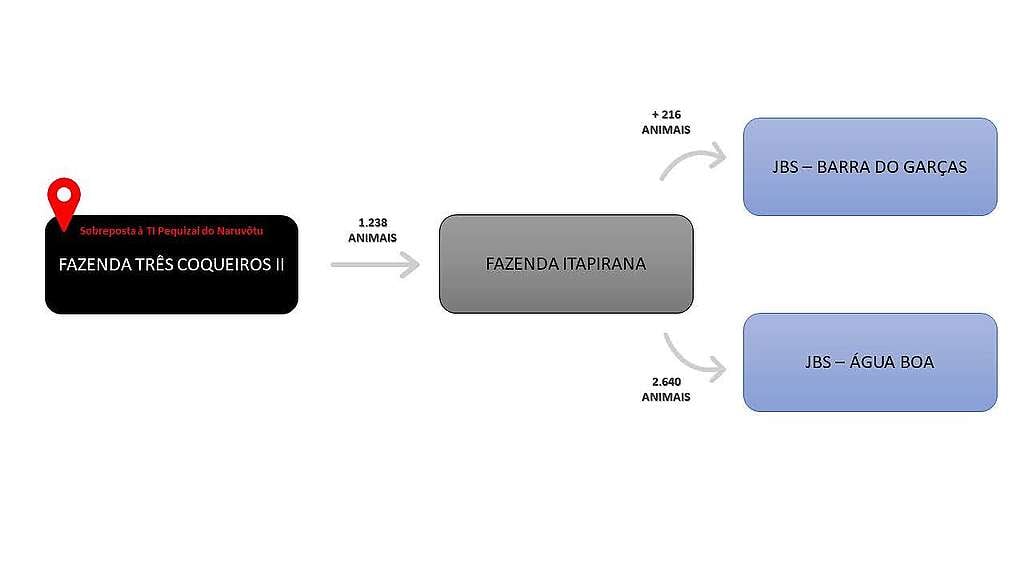Greenpeace Brazil has revealed that beef from cattle raised illegally on protected Indigenous land in the Amazon rainforest may have ended up on the plates of consumers all around the world after entering the supply chains of Brazilian beef giant JBS.
The new investigation focuses on trade links between JBS and Mauro Fernando Schaedler, a Brazilian agribusiness entrepreneur who owns four properties that border or partially overlap with the Pequizal do Navurôtu Indigenous Land, which is a legally protected Indigenous territory.
The Naruvôtu are an Amazonian people who have fought for decades to have their territory legally recognised and protected. While the Pequizal do Naruvôtu Indigenous territory was identified in 2006 and finally granted full official protection by the Brazilian government in 2016, ranchers in the region have continued to contest its demarcation as Indigenous land. Among those who have attempted to discredit Naruvôtu's claim to their territory is none other than Mauro Fernando Schaedler.
Schaedler's farms in the Amazon currently face fines of almost half a million euros from Brazil's government for a string of environmental offences: Schaedler has been fined a few times, since the late 2000s by the Brazilian Environmental Agency IBAMA. Most recently, in 2023, Schaedler's farm Fazenda Três Coqueiros II received a fine and was embargoed for raising cattle without a license inside the Naruvôtu's territory. The embargo issued by Brazil's environmental agency IBAMA affected 592 hectares of the farm within the Naruvôtu land.
However, Schaedler has managed to sell the cattle illegally raised on Naruvôtu land by transferring cattle reared on Fazenda Três Coqueiros II to another farm, a practice known as 'cattle laundering'. Between January 2018 and November 2024, Fazenda Três Coqueiros II sent cattle to another farm, Fazenda Itapirana, which supplied cattle to two JBS slaughterhouses.
Figure 01: Cattle movements between Fazenda Três Coqueiros II, Fazenda Itapirana and JBS in Água Boa and in Barra do Garças

Organisation: Greenpeace Brazil (2025)
The JBS slaughterhouse in Água Boa (in Mato Grosso state) received cattle from Fazenda Itapirana from February 2019, until as recently as February 2025. This slaughterhouse is authorised to export to several places, including Hong Kong.
The other JBS slaughterhouse, in Barra do Garças, is approved for exports to the EU, Canada, UK and many others. Greenpeace Brazil's investigation found out that this slaughterhouse purchased cattle from Fazenda Itapirana from 2018 and 2021 and exported meat to several European countries within that time period, according to Brazilian export data obtained via Comex Stat.
This means that meat from Schaedler's farm, from cattle raised illegally on Indigenous land, may well have been served to unwitting consumers across Europe and many other countries.
It is relevant to note that the JBS slaughterhouse in Barra do Garças continues to export to Europe today, although Greenpeace Brasil has not identified data indicating that it has bought cattle from Fazenda Itapirana after July 2021. According to Brazilian export data for the first half of 2025, Europe was the second largest market for beef exports from that slaughterhouse, imported by Spain, Germany, the UK, Italy and the Netherlands. Until the landmark EU Deforestation Regulation (EUDR) is finally implemented, the EU will have no means to ensure that meat linked to deforestation of the Amazon or land conflicts does not land on European markets.
This investigation provides just one example of how JBS and large corporations profit and expand from the absence of a comprehensive, effective and transparent control system for their supply chain, which indirectly supports environmental damage and the violation of constitutional rights and guarantees, especially the fundamental rights of Indigenous Peoples in Brazil.
This case study demonstrates how links to the violation of Indigenous Peoples' rights persist in the meat supply chain of JBS, potentially ending up on the plates of consumers all around the world – despite commitments by JBS and other large meatpackers to ensure traceability of their entire supply chain, and pledges by global leaders to halt and reverse deforestation by 2030.
Time and again, Big Agribusiness companies like JBS have proven unable or unwilling to protect the forest and those that call it home. We urgently need global action to defend the Amazon and hold Big Ag to account for the damage it is causing.
With policy-makers considering whether to approve the controversial EU-Mercosur trade agreement, political decisions taking place in the EU right now could make the situation even worse. The EU-Mercosur deal will increase meat import quotas from Brazil to the EU without guarantee that these imports are not linked to deforestation or violations of Indigenous Peoples' rights.
European governments and parliamentarians must reject the EU-Mercosur trade deal and ensure the swift application of the EU Deforestation Regulation without further delay or dilution.
At COP30, global leaders should commit to an action plan for forests to ensure a thriving Amazon for future generations.
Download full report:






